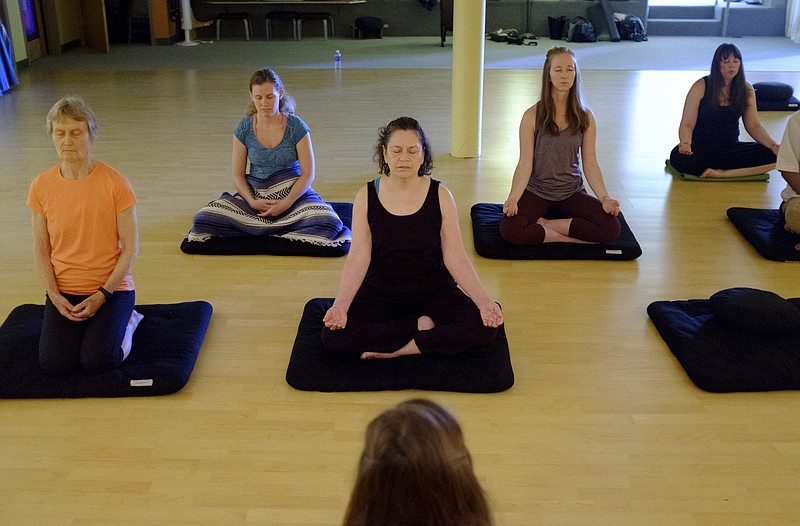View other columns by David Cook
How free are we in America?
Yes, we're free on the outside: look no further than the Bill of Rights and voting booths.
But look inside.
How free are we in our minds and hearts?
How free are we from anger, which can imprison?
And anxiety, which can shackle?
And sadness, which can enslave?
In this month's "Dear Monk," meditation teachers Kittisaro and Thanissara discuss the ways our minds affect our freedom.
They're world-renowned meditation teachers; he's from Chattanooga, she's from London. They met at a Buddhist monastery in England, where they'd been monastics for more than a decade. They got married, founded a South African hermitage, wrote books, earned degrees in mindfulness-based psychotherapy and created the Chattanooga Insight Meditation Society.
They've lovingly agreed to help us learn to live with more peace and ease in America.
We're calling it "Dear Monk," an advice column for the 21st-century heart and mind. Questions are yours and mine; the answers, theirs.
Dear Monk, many days, I feel trapped by emotions, like anger and anxiety. How can meditation help?
Freedom from painful emotions is not in their absence but in changing the relationship to them.
Feelings are like the weather. They come and go according to circumstance.
It is important to know we can respond rather than react to our feelings.
Between acting out and repressing emotion, there is a third option: mindful attention and investigation.
Once you realize you are caught in painful feelings, take your attention to a neutral and stabilizing experience; say the sensation of the breath, the feet touching the ground, the pressure of your butt sitting on the seat, your hands on the steering wheel.
Don't try and figure the feeling or emotion out. Don't justify or blame.
Instead, keep the point of stability in your awareness (your breath, for example) while bringing your attention directly to the feeling in your body.
Relax while breathing through the feeling.
A deeper sense of perspective will start to emerge. With awareness, wisdom arises. So instead of reacting, we investigate our emotion and thoughts.
We discern carefully: What is true? What is blinding us? What can we learn from our experience?
We may even see some of the causes, some of the old habits, we may even be able to let go, to let things be. Or, if we respond, we have a better chance of acting from clarity and centeredness.
The important thing when working with painful emotions is to be patient, to be kind, to let awareness lead rather than reactivity.
What does true freedom look like?
The Thai meditation master Ajahn Chah said, "Know and watch your heart. It is pure but emotions come to color it. Let your mind be like a tightly woven net to catch those emotions and investigate them before you react."
This means that freedom is already here.
We become confused by what moves through the heart: the emotions, mind states, events, all the things we experience. While everything is in a process of change, what knows each experience is changeless. What knows is consciousness.
When we realize this as our true nature, then we know peace. To know this directly is the deeper work of meditation, but it requires practice, and again, a lot of patience.
When I meditate, my mind won't stop thinking. Is that bad?
It doesn't matter if all sorts of thoughts come and go. Notice the tendency to start judging. Notice the thoughts we think: "I'll never be able to meditate. My mind is a mess."
Instead, practice paying attention to our thoughts: "Ahh, there's worry. There's doubt."
Patiently notice the streams of distracting thoughts. Let them be, and kindly encourage the attention to return again and again to the present moment.
Through meditation, we train ourselves to be with the simplicity of sitting and listening. This way we are not a slave to our habitual thoughts and moods.
We don't have to make it complicated or special. Relax and give yourself permission to enjoy the simplicity of consciously being here, now, experiencing this sensitive body supported by the Earth.
What time frame do you recommend for meditation?
We recommend a length of time at which you can succeed. If you're a beginner start with 10 to 15 minutes in the morning, perhaps in the evening. Twenty minutes is good for a busy day. We found the Insight Timer app to be a wonderful resource.
As our teacher Ajahn Chah said, if you breathe, you have time to meditate. Use each breath, each step, to ground into your body and awareness.
David Cook writes a Sunday column; send "Dear Monk" questions to dcook@timesfreepress.com or 423-757-6329. Follow him on Facebook at DavidCookTFP.
